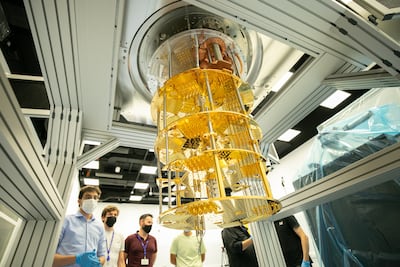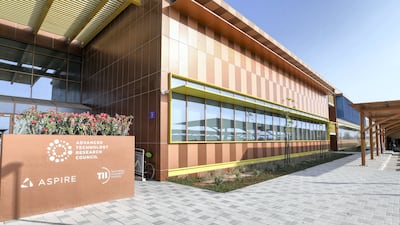Abu Dhabi-based Technology Innovation Institute has opened an impact lab to boost research into materials science, further bolstering the UAE's knowledge economy.
The lab, which is part of the TII’s Advanced Materials Research Centre (AMRC), will offer an “ideal test bed for trialling materials, laminates and composites” and aims to bring advanced materials to a stage once they are ready to transition from lab to the industry.
“Tests are conducted under a range of impact-related environments … state-of-the-art equipment will be used to evaluate the behaviours of the materials that help develop breakthrough solutions,” TII said.
TII, the applied research arm of Abu Dhabi's Advanced Technology Research Council, is a critical part of the UAE's efforts to diversify its economy from oil and develop a knowledge-based economy.

It is home to the Middle East's first quantum computer and to teams of researchers developing advanced materials, drones and robots for commercial use. It is also leading research in various fields, such as artificial intelligence, autonomous robotics, quantum computing, cryptography, secure communication, smart devices, advanced materials and space technologies.
“We are committed to offering our researchers an enabling environment to work on their collaborative and proprietary research projects and fast-track innovations to the marketplace,” Ray Johnson, TII’s chief executive, said.
One of the 10 initial dedicated research centers at TII, AMRC was established to develop applied research on metals and composites.
The new lab is fully compliant with international safety regulations and is equipped with facilities to study and explore new materials to analyse their impact and blast properties, Rafael Santiago, lead researcher on the energy absorption team at AMRC, said.
With such experiments being conducted in the region for the first time, he hoped the lab could provide new solutions to pressing challenges in the real world.

"We are proud to launch this lab, the outcome of months of planning and hard work, to ensure that it is capable of testing new technologies related to materials impact, as well as new manufacturing processes,” Mohamed Al Teneiji, chief researcher at AMRC, said.
The lab is capable of characterising metallic, polymeric, ceramic and composite materials rapidly into prototypes with real-world applications. Its findings intend to prevent space rovers from crashing and create helmets, bumpers, tyres and car batteries that can withstand explosions.


